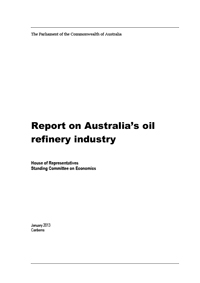The Oil Refining Industry and Supply Security
Publication date
01 Sep 2017
Resource Categories
Resource Type
Description
On 5 February 2013 the House of Representatives Standing Committee on Economics tabled its Report on 'Australia's Oil Refinery Industry', following the Committee's inquiry in 2012. The Inquiry was conducted in relation to claims and concerns being raised about the viability of Australia's oil refinery industry, and the potential impacts of declining domestic refinery capacity on the economy, energy security and employment in the sector. The Report reconfirmed the findings and conclusions contained in the Government's 2012 Energy White Paper.
Some key highlights in the Committee's Report in relation to the oil refining industry include the following:
- The global oil refining industry is undergoing significant structural change.
- Larger, more efficient refineries are being established in the Asian region resulting in increased competitive pressures on refining operations in other regions.
- The expansion of refining capacity in Asia has led to the rationalisation of refining in established markets such as Europe and the United States of America. Australia's domestic refining industry is similarly facing competitive pressures.
- The domestic context of high operating costs, ageing facilities, increasing sea miles for the transport of crude to the refineries, shallow berths that are not suitable for large crude carriers, increasing technical complexity needed for refining of the broad range of crude oil and the high Australian dollar, put Australia at a competitive disadvantage, resulting in the closure of some domestic refineries that are no longer commercially competitive.
- While Australia's proximity to the Asian region does pose some challenges for domestic refineries, it also provides opportunities to take advantage of Asia's surplus refining capacity and to continue to strengthen supply chains in the region.
- The market for liquid fuels is robust and, from the available evidence, it is operating soundly. Australia is well serviced by reliable and diverse supply chains.
- The changes in domestic refining capacity to date will not impact on Australia meeting its liquid fuel requirements. There are reliable, mature and highly diversified international fuel supply chains, which provide Australia with economic security.
- The closure of the refineries will not lead to negative price outcomes for consumers. Australian fuel prices reflect an import parity price, which is the price in international markets. The Australian Competition and Consumer Commission was clear in its advice to the committee that as a result of import parity pricing, the retail price for petrol is not impacted by refinery closures.
- Australia can source its liquid fuel needs from a diversity of sources so that if one source becomes unavailable other sources can meet demand.
- Some domestic refining capacity is a worthwhile complement to imports as part of having reliable, mature and diverse supply chains for liquid fuels.
The Committee's Report is available.
